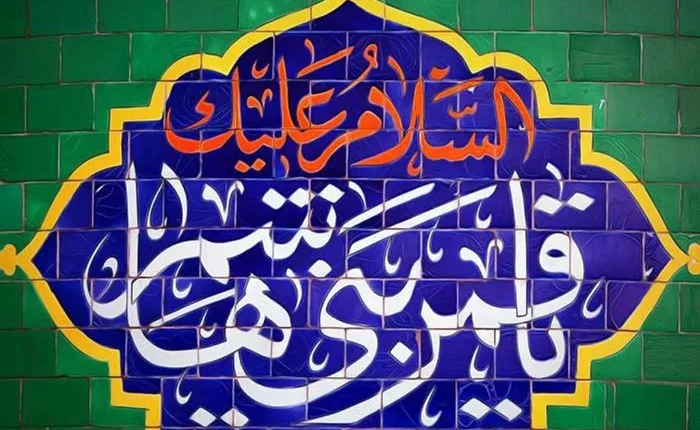Abul Fadl al-‘Abbas ibn Ali (a): The Moon of Banu Hashim
Contents
Abul Fadl al-‘Abbas was the valiant and courageous son of Ali ibn Abi Talib (a) and Umm al-Banin, born on Sha’ban 4, 26 AH. In this article on Islam4u, we will explore the life and character of this noble personality.
Al-‘Abbas’s Birth
Abul Fadl al-‘Abbas was born on Sha’ban 4, 26 AH. His arrival was met with boundless joy and happiness in the household of Imam Ali (a), as he was seen as a blessing from Allah (SWT) Himself. The story of how al-‘Abbas came to be born is quite interesting. Imam Ali (a) purposefully asked his brother ‘Aqil, a highly knowledgeable genealogist, to find for him a wife who would give birth to brave sons. Imam Ali (a) knew the future of his son Imam al-Hussain (a), and was thus looking for a wife who would give birth to a son who would loyally support Imam al-Hussain (a) in Karbala. ‘Aqil informed Imam Ali (a) of a noble lady from the Banu Kilab tribe named Fatima bint Khizam. She was later known as Umm al-Banin. Therefore, Imam Ali (a) married her and had four sons with her:
1. al-‘Abbas
2. Abdullah
3. Ja‘far
4. Uthman
Al-‘Abbas’s Traits
With a physique and handsomeness that earned him the moniker “the Moon of Banu Hashim,” al-‘Abbas had physical prowess that left all who beheld him in awe. His bravery and courage knew no bounds, as none could match him in single combat. However, beneath this formidable exterior lay a heart of pure gold, brimming with kindness and compassion. He remained steadfastly loyal to his brethren, Imam al-Hassan (a) and Imam al-Hussain (a), their bond unbreakable. And when the day of Ashura dawned amidst the turmoil and chaos of Karbala, he sought his brother’s guidance and followed his every command with unquestioning obedience.
Wife and Children
Abul Fadl al-‘Abbas married Lubaba, the daughter of Ubaydullah ibn ‘Abbas, and had four sons named Ubaydullah, Fadl, Hassan, and Qasim. He also had one daughter.
Names and Titles
Al-‘Abbas is a name that resonates with bravery, valor, and chivalry. It means a lion from whom all other lions flee. His courage and fearlessness are legendary, and he is renowned for his unwavering commitment to justice and righteousness. Among the many titles bestowed upon him, one of the most famous is Abul Fadl, which means the father of virtue. This title is a testament to his genuine commitment to upholding the highest ethical standards.
In addition to his reputation for courage and virtue, al-‘Abbas was also known for his striking good looks and unique spirituality. He was often referred to as the “Moon of Banu Hashim” due to his unparalleled handsomeness and captivating presence. His spiritual depth and faith made him a source of inspiration and guidance for many.
Other titles attributed to al-‘Abbas include “the Flag-bearer of Karbala and Imam al-Hussain,” a nod to his pivotal role in the Battle of Karbala, and “the Water-bringer of Karbala,” a reference to his heroic efforts to bring water to the thirsty children of Imam al-Hussain (a). However, perhaps the most important title bestowed upon him is “the Door to Wishes (بابُ الحَوائِج).” This title is a testament to his reputation for fulfilling the wishes of all who invoke his name, regardless of their faith or background. Even non-Muslims have had their wishes granted by al-‘Abbas, a testament to the universal appeal of his noble character and selfless service.
Al-‘Abbas’s Role in Karbala
When the caravan of Imam al-Hussain (a) halted in Karbala, Abul Fadl al-‘Abbas assumed a vital role as the second-in-command of the army. He safeguarded the women and children and carried the standard. As long as al-‘Abbas was alive, everyone felt secure, assured that no harm would befall them. When the moment of combat arrived, al-‘Abbas readied himself to defend the Prophet‘s grandson (s) and asked Imam al-Hussain if he could enter the fray.
The adversaries prohibited anyone from the Imam’s caravan from approaching the al-Qama stream to obtain water. Upon seeing the children’s thirst, Imam al-Hussain (a) said to al-‘Abbas, “Observe my offspring and fetch them some water.” Al-‘Abbas willingly obeyed his master and rode towards the stream. His presence and magnificence terrified the opposition, so al-‘Abbas filled his waterskin and embarked toward the tents.
On the way, the adversaries surrounded him and showered him with arrows. They cut off both his hands, aimed an arrow at his eye, and shot at the waterskin. Al-‘Abbas fell from his horse. An enemy approached him and struck him on the head with an iron rod. Al-‘Abbas pleaded, “O my brother, come to my aid!” Imam al-Hussain hastened to him and cradled his head on his lap. Before al-‘Abbas met his martyrdom, he expressed his sorrow to Imam al-Hussain, saying, “You have placed my head on your lap now, but I fear no one will be there to hold your head in his lap when your hour comes.” Thus, al-‘Abbas fell as a martyr.
Conclusion
Al-‘Abbas ibn Ali was a prominent figure in Islamic history. He played a significant role in the Battle of Karbala, where he fought alongside his brother Imam al-Hussain and was ultimately martyred. Al-Abbas is remembered for his courage, loyalty, and selflessness. He is particularly revered for his commitment to his brother’s cause, even in the face of overwhelming odds. His actions continue to inspire Muslims around the world to this day, and he remains a symbol of the ultimate sacrifice one can make for a just cause. Despite his tragic end, al-Abbas’s legacy lives on through the numerous shrines and commemorations dedicated to him throughout the Muslim world. His story serves as a reminder of the importance of standing up for one’s beliefs and fighting for what is right, even when the odds are stacked against you.

